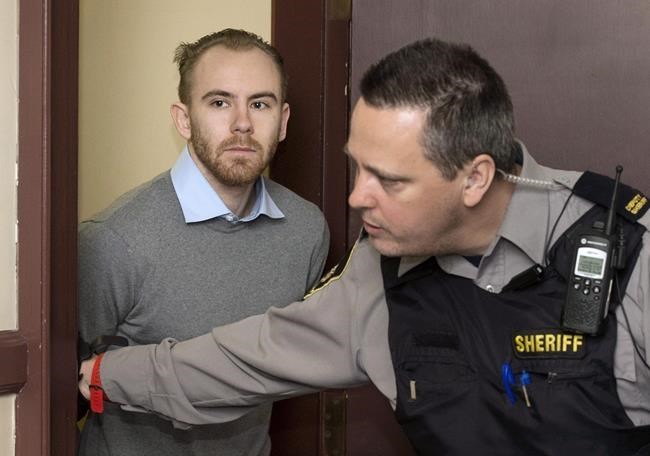HALIFAX — A jury found a former Halifax medical student guilty of second-degree murder on Saturday in the 2015 shooting death of a fellow student whose body has never been found.
During his trial, William Sandeson had testified before a Nova Scotia Supreme Court jury he killed physics student Taylor Samson in self defence on Aug. 15, 2015, but the jury didn't accept that claim.
"It appears the jury has rejected the self defence statement ... and that's why they came to the determination of a second-degree murder outcome," said Crown prosecutor Carla Ball, in an interview outside court.
Before coming to the decision, jury members deliberated for about 23 hours, beginning on Thursday.
The lead juror first announced that Sandeson had been found not guilty of first-degree murder before declaring him guilty of the lesser charge, as Samson's family members sat listening quietly.
"We wanted first (degree) murder, but we're going to take what we can get," Samson's mother Linda Boutilier told reporters. "He (Sandeson) is evil. There's a special place in hell for him."
The six-week trial marked the second time Sandeson was tried for the crime. He was convicted of first-degree murder in 2017, but the verdict was overturned on appeal and a new trial was ordered in 2020.
Those convicted of second-degree murder face an automatic life sentence, but the presiding judge can set parole eligibility at between 10 and 25 years. Unlike first-degree murder, which involves a killing that is both planned and deliberate, second-degree murder is a deliberate killing that occurs without planning.
A conviction of first-degree murder brings an automatic life sentence with no chance of parole for 25 years.
Sandeson has already been in jail for about seven-and-a-half years, which will reduce the length of time he has to serve before parole eligibility, said Crown prosecutor Kim McOnie.
The Crown had argued during the trial that Sandeson was motivated by greed to kill Samson, 22, and steal the nine kilograms of marijuana he had brought to Sandeson’s downtown apartment to sell.
During the trial, McOnie said Sandeson had planned to sell the stolen marijuana to clear a $78,000 debt just as he was starting medical school at Dalhousie.
The Crown lawyer said proof of Sandeson’s get-rich-quick scheme lay in a text he sent to his father a few months before the killing, saying the outstanding debt would be paid off by September. McOnie also pointed to other texts he sent soon after the shooting, including one to a friend that declared: "Student loan paid off. I'm squeaky clean now."
McOnie also told the jury Sandeson had purchased cleaning products in anticipation of destroying evidence of a bloody crime scene.
"How many 22-year-old students do you know have seven litres of bleach in their apartment?" she asked, adding the evidence showed Sandeson had cleaned the entire apartment within two hours of the killing.
Testifying in his own defence, Sandeson rejected all of those arguments. He said he brought his 9-mm semi-automatic handgun to the drug deal to intimidate Samson, not to kill him.
"I pulled the trigger, but I never wanted to hurt anyone that night," he told the jury.
He testified that he feared for his life when Samson lunged at him during an argument over payment.
Sandeson admitted to disposing of the body by dumping it in a tidal river that feeds the Bay of Fundy near Truro, N.S. He denied the Crown's allegation that he dismembered the corpse to make it easier to handle. He said he panicked after the shooting, knowing he would face criminal charges for the death and the drug dealing.
His lawyer, Alison Craig, said her client knew his dream of becoming a doctor would be over if he called 911. "Drug dealers don't become doctors,” she said.
Craig challenged the Crown’s assertion that Sandeson was motivated by greed and financial gain, arguing her client was financially well off. She said he had three part-time jobs, and his own drug-dealing business was pulling in about $8,000 a month.
"He had everything to look forward to in life," Craig said. "He did not have the intent for murder."
Craig also argued that the Crown's claim that the killing was well-planned made no sense. She told the jury that her client had left his surveillance cameras on for most of that night, knowing that they would capture Samson's arrival shortly before 10:30 p.m.
The jury did not hear a police interview with Sandeson in which he offered several different accounts of what happened to Samson, none of which involved a shooting in self-defence. In his final account, Sandeson told investigators three unidentified assailants in black bodysuits entered the apartment, shot Samson in the head and carried his body away.
Justice James Chipman ruled the evidence inadmissible on the grounds that Sandeson's Charter rights had not been respected.
Chipman set a sentencing hearing for April 20 and 21, and Ball said the Crown will be seeking a sentence that is "above the minimum."
Craig declined to comment outside court, noting Sandeson's parole eligibility date will likely be a contested issue.
This report by The Canadian Press was first published Feb. 18, 2023.
— With files from Michael MacDonald in Halifax.
Michael Tutton, The Canadian Press


